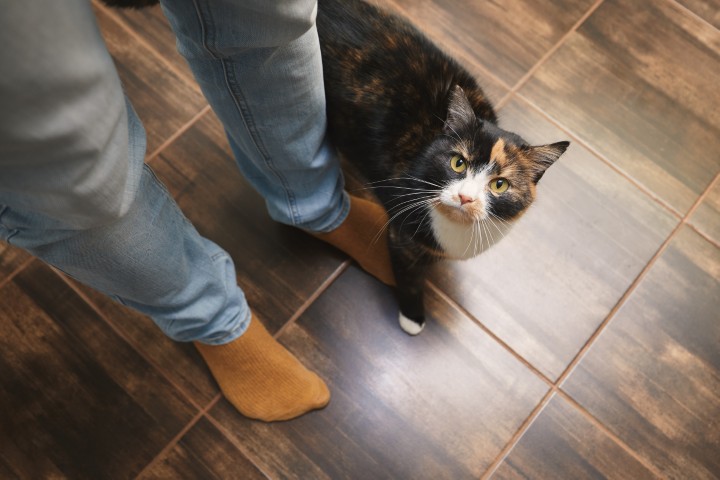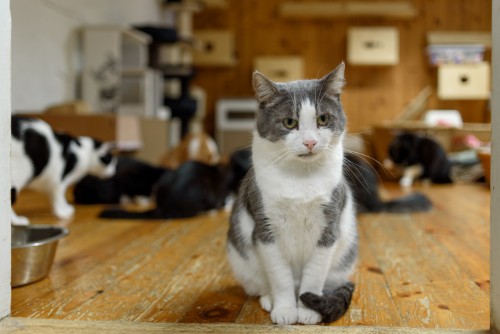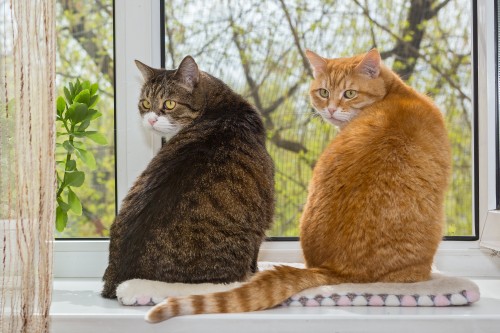Automatic litter boxes are all the rage these days, especially for busy cat parents like us hoping to make scooping a thing of the past. In a subsequent article, we explored some of the advantages of self-cleaning litter boxes from odor control to less frequent maintenance. But what about the flip side?
While the tech behind robotic litter boxes is undeniably impressive, it’s important to know they’re not always the seamless, hassle-free solution they promise to be. So, before you spring for one of these high-tech boxes, let’s walk through some of the most common disadvantages cat owners report in regards to these devices.
👉🏾 Not sure if a self-cleaning litter box is right for you?
Stick around, or better yet, grab our free Quick Reference Cheat Sheet to help you weigh the pros and cons more easily as you read. It’s a simple one-pager you can save or print for later.
1. Higher Maintenance Than You Might Expect
At first glance, automatic litter boxes seem like they eliminate the mess entirely. But in reality, they require regular upkeep beyond what many expect. Yes, they scoop automatically, but you still need to:

- Empty the waste drawer frequently (especially in multi-cat households)
- Deep clean the internal components every few weeks
- Monitor and clean sensors to avoid malfunction
- Replace mechanical parts that wear down over time
If you’re hoping for a totally hands-off experience, these boxes might leave you disappointed.
2. Expensive Upfront Cost (and Ongoing Costs Too)
Automatic litter boxes don’t come cheap. Many start around $400 and go up to $700 or more depending on the model and features. And that’s just the beginning.
You may also need to:
- Purchase special types of litter
- Replace trays or liners
- Buy replacement parts like sensors, motors, or waste bins
It’s an investment, and the cost adds up, especially if the box requires frequent repairs or doesn’t last as long as you expected.
3. Litter Compatibility Issues
Not all robotic boxes accept standard cat litter. Some models require specific litters to function properly, and your cat might not approve of the change. Cats are creatures of habit, and switching their litter texture or scent can lead to rejection of the box altogether.
For households with picky felines, this can mean wasting time (and money) trying to find a compatible match that works for both the machine and the cat.
Since this is such a tricky subject, I’ve put together a guide that will help you decide How To Choose The Right Cat Litter for Your Self-Cleaning Litter Box. You can check it out by clicking the button below.
4. Space-Hungry Designs
Let’s be real, these litter boxes are big. Their mechanical parts, waste compartments, and privacy covers take up significant space. If you live in a small apartment or tight home layout, finding a discreet spot for a box that resembles a spaceship can be a real challenge.
Even more, the interior space where the cat does its business can be cramped, particularly for larger breeds or cats who prefer more room to turn around.
If you’re having space issues for your living area or where your cat has to go, we’ve got you covered! Checkout this comparison on two top self-cleaning litter boxes.
One is good for small areas like apartments while the other is larger and more robost for bigger cats like Maine Coons. You can read more by clicking the button below.
5. Noisy Operation That Scares Some Cats
Most automatic litter boxes make noise when cycling. Whether it’s a rotating drum or a raking mechanism, the hum and buzz can frighten more sensitive or skittish cats. This fear can discourage them from using the box entirely.
Cats that are new to automatic litter boxes may need a slow introduction and extra patience but in some cases, they never warm up to the noise.
The good news is that there are a couple of good quiet models out there. Furthermore, you don’t have to spend all your precious coins testing out all the different models or spending hours getting lost in all the noise researching on the internet.
We’ve made it easy. Click the button below to learn more about the quiet self-cleaning litter box we recommend for skittish, anxious and even senior cats.
6. Not Ideal for All Cats

Automatic litter boxes are typically designed for average-sized, healthy adult cats. Kittens, senior cats, or cats with mobility issues might struggle to get in and out of the box safely. Others might be intimidated by the cycling motion or enclosed designs.
That means your fancy new box could end up unused, while your old manual box remains your cat’s favorite.
7. Inconsistent Cleaning Results
While marketed as self-cleaning, many units miss waste during cycles, especially if the waste clumps too quickly or the sensors misread the timing. This can lead to lingering odor or dirty residue that builds up over time.
Some users also report that the cleaning mechanisms jam or break, making the unit unusable until repaired.
I know (& I’m sure you do too) first hand how NOT fun it is to spend so much money on something just to find out it doesn’t work or breaks on you after just a couple of uses. Unfortunately, as self-cleaning litter boxes become more popular, so is this trend of sellers charging ridiculous prices for something that isn’t worth it.
This is one of the reasons I created this site in the first place, to save you time, money and stress! So if you’re looking for a good option for automatic cat litter box, click the button below to see my top recommendation.
8. Complicated Setup and Troubleshooting
Despite the promise of plug-and-play convenience, setting up an automatic litter box isn’t always easy. The instruction manuals can be lengthy, the initial calibration can be finicky, and when things go wrong, troubleshooting often feels like working tech support.
Customer service experiences vary greatly between brands, with some companies being responsive and helpful, and others, not so much.
9. May Not Work Well in Multi-Cat Households

Some robotic litter boxes are only rated for a single cat. In multi-cat homes, you may need more than one box or deal with issues like:
- Overfilled waste drawers
- Shortened cleaning cycles
- Increased odor due to heavier usage
Without enough boxes to go around, stress and territorial behavior can also lead to litter box avoidance.
10. Reliability Depends on Your Unit
Not all units are built the same. While some cat parents rave about their automatic litter boxes, others share stories of malfunctioning sensors, poor build quality, or unhelpful tech features.
Getting a “bad” unit can mean constant repairs or replacements and the return process can be a hassle. For every glowing review, there’s often someone warning others to stay away.
Are you looking for a self-cleaning litter box that you can depend on without being overly expensive? Click the button below to ‘Read More’ about my top recommendation!
Final Thoughts: Is an Automatic Litter Box Right for You?
Robotic litter boxes offer modern convenience, but they also come with their fair share of challenges. From the cost and size to the tech quirks and cat preferences, there’s a lot to weigh before making the switch.
If you’re tech-savvy, have the space, and are okay with a little trial-and-error, these high-tech boxes might fit seamlessly into your life. But if you’re looking for a truly maintenance-free solution or have a picky cat, they might cause more frustration than relief.
At the end of the day, your cat’s comfort and hygiene come first. And sometimes, a well-scooped traditional litter box still does the job just fine.
Want to explore the other side of the story? Check out this article next where we discuss If Self Cleaning Litter Boxes Are Tuly Worth It to get the full picture before you decide!
Great article! I never considered how expensive automatic litter boxes can be. ???? Plus, what if they malfunction? I heard some cats don’t like them either, which can be a hassle. ???? Have you had any issues with your automatic box? I’d love to hear more about your experiences! Let’s keep the conversation going; sharing this post to help others become aware! ???? #PetCare” }
Hey Marty,
Thank you so much for your support and for sharing the post! You’re absolutely right, automatic litter boxes can be quite an investment, and potential malfunctions or cat hesitancy are definitely factors to consider.
Since many cat owners face challenges with getting their pets comfortable with a self-cleaning litter box, we’re working on a detailed guide on how to help cats adjust to one smoothly. We’ll cover tips on gradual transitions, placement strategies, and ways to make the experience stress-free for both you and your cat.
We’ll link the guide here once it’s ready so stay tuned!
Thanks again for the great discussion!
Automatic litter boxes are a convenient innovation, but they come with their own set of drawbacks. One major concern is maintenance—while they reduce the frequency of manual scooping, do they actually require more effort in terms of cleaning and upkeep?
I wonder about reliability. Have users reported malfunctions, sensor issues, or even mechanical failures over time?
Additionally, cost is an important consideration. Automatic litter boxes tend to be expensive compared to traditional ones. Are the benefits worth the investment, or are there more cost-effective alternatives that provide similar advantages?
Lastly, how do cats react to automatic litter boxes? Some pets may be hesitant or fearful of the moving parts and sounds. Have cat owners found ways to successfully transition their pets to using these devices, or is this a significant hurdle?
Hey Laura,
Great questions! Automatic litter boxes definitely bring convenience, but as you pointed out, they also come with factors like maintenance, reliability, cost, and cat adaptability.
Different models perform differently in these areas, which is why we’re currently working on a comprehensive guide that will break down the best options, their pros and cons, and how to transition your cat smoothly.
Once we finalize our top recommendations, we’ll link the guide here so you can make an informed decision. Stay tuned, and thanks for your patience! ????????
Look forward to connecting,
Marlinda
This article does a great job of balancing the pros and cons of automatic litter boxes. While the convenience factor is tempting, the upkeep, noise, and space issues are definitely worth considering.
I hadn’t thought about how some cats might be scared of the noise or struggle with limited space comfort really is key! The point about multi-cat households needing multiple units is also eye-opening; that could quickly become expensive.
Given these factors, do you think there’s a particular brand or model that does a better job at addressing these issues?
Hey Kavitha,
Great question! There’s definitely a lot to consider when choosing the best automatic litter box, especially when factoring in noise levels, space efficiency, and multi-cat use. Since this is such an important topic, we’re putting together a detailed article that will explore the best brands and models that address these concerns, along with practical tips on choosing the right one for your household.
We’ll link the article here once it’s ready, so stay tuned! 😊 Thanks for your patience, and we appreciate your interest in making litter box life easier for both you and your cat! 🐾